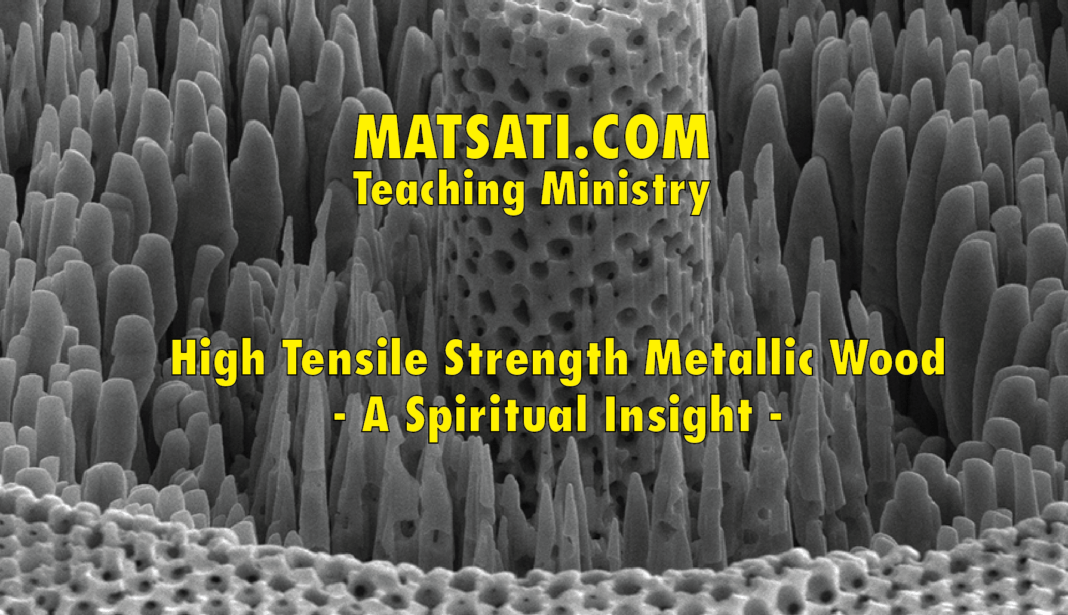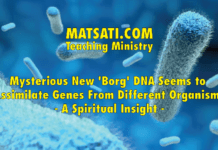Wood from since the beginning of time has been an ideal building material because of its high strength-to-density ratio which is in fact a very unique physical property. The idea of strength to density ratio may be easily observed, wood is capable of being grown (by trees) to hundreds of feet tall and yet remain light enough to float down a river to a sawmill. The material strength is the measure of force per unit area at failure, divided by its density. This is also known as the strength-to-weight ratio or strength-to-mass ratio, etc. In this research paper [1], scientists report on a crack-free self-assembly approach to fabricating metallic wood on a centimeter-scale nickel lattices which have a size of 100 nm, a grain size of 30 nm, and a tensile strength of 260 MPa which approaches the theoretical strength limit for porous nickel. This kind of research advances the fabrication techniques and possible new applications which require high-strength multifunctional porous materials.
References
- Zhimin Jiang et al, Centimetre-scale crack-free self-assembly for ultra-high tensile strength metallic nanolattices, Nature Materials (2021). DOI: 10.1038/s41563-021-01039-7, https://www.nature.com/articles/s41563-021-01039-7
While looking at this material, the images appear to have a physical arrangement of cells in the form of a metallic sponge. One of the ways in which this kind of manufacturing takes place is to mix metal powder with a polymer at the correct ratio. Then when firing the material (putting it under high heat) the polymers burn up leaving void spaces in the metal to make a metallic sponge. Note this is a rigid sponge, it is not flexible like a natural sponge. One can also use this technique to create pore spaces on the anode and cathode of solid oxide fuel cells and/or in catalysis for increasing the surface area of the catalyst or even for sorbent technology. In the case of this research paper, the metallic wood, the pore arrangement was very uniform and non-random. The pore structure using this technique of self-assembly creates precise spacing of gaps in the material. The reason this is called “metallic wood” is because the nano-scale nickel structures are full of regularly spaced cell-sized pores that significantly reduced its density, a key feature of wood, the model which inspired this research. Another interesting feature, the size of the porous structures are on the scale of the wavelength of visible light, therefore, the light becomes attenuated as it is reflected off the metallic wood. This produces a dazzling effect as the observer moves while looking at the material. This suggests this material may also be used in sensor development.
One of the engineering difficulties in manufacturing this material is the problem of cracking which prevents the material from being manufactured to any meaningful sizes. Recently, researchers have overcome this difficulty by growing these metallic woods from the nano-scale to films that are large enough for use in practical applications. When cracks form, this is due to bonds between the atoms breaking and cleaving the structures from one another. Having too many metal atoms agglomerating on one spot has also been a long standing problem. Notice that according to the research paper [1] the manufacturing technique uses nano-spheres as a void space maker, this is similar to the metallic sponges manufacturing technique. The researchers build these materials by creating a solution of nanoparticles and then evaporate the aqueous solution until the particles are dry and regularly stacked. Water is the liquid used and the surface forces on water are very strong, so much so that it is capable of ripping the particles apart to form cracks, similar to the way cracks form when sand is dried. The new strategy was to use self-assemble particles which keep the template wet. This prevents cracking and the researchers lock the particles in place using electrostatic forces. This new manufacturing technique allows for this new metallic wood to be used to build new devices. The porous metals are three times stronger than previous porous metals and have similar relative density, and one thousand times larger than nano-lattices. This new material has applications in the development of new membranes to separate biomaterials, protective coatings, or flexible sensors, the goal now is to use this material to make “impossible devices” which previously have not existed!
The Spiritual insights that we receive from this type of research is related to strength, and reminds us of what is written in the Shema.
ספר דברים פרק ו
ד שְׁמַ֖ע יִשְׂרָאֵ֑ל יְהוָ֥ה אֱלֹהֵ֖ינוּ יְהוָ֥ה׀ אֶחָֽד׃ ה וְאָ֣הַבְתָּ֔ אֵ֖ת יְהוָ֣ה אֱלֹהֶ֑יךָ בְּכָל־לְבָבְךָ֥ וּבְכָל־נַפְשְׁךָ֖ וּבְכָל־מְאֹדֶֽךָ׃
Devarim / Deuteronomy 6:4-5
6:4 “Hear, Israel! The Lord is our God, the Lord is one! 6:5 And you shall love the Lord your God with all your heart and with all your soul and with all your strength. (NASB)
The Shema is taken from Devarim / Deuteronomy 6,which starts out saying, שְׁמַ֖ע יִשְׂרָאֵ֑ל יְהוָ֥ה אֱלֹהֵ֖ינוּ יְהוָ֥ה׀ אֶחָֽד “hear oh Israel, the Lord our God is one.” This is regarded as the most important prayer in Judaism. This is because it reminds one of the key principles of faith, that there is only one God. This is a monotheistic principle. The Shema continues saying, וְאָ֣הַבְתָּ֔ אֵ֖ת יְהוָ֣ה אֱלֹהֶ֑יךָ בְּכָל־לְבָבְךָ֥ וּבְכָל־נַפְשְׁךָ֖ וּבְכָל־מְאֹדֶֽךָ “And you shall love the Lord your God with all your heart and with all your soul and with all your strength.” The latest research reports on a new manufacturing technique that allows for the creation of a metallic wood material which has a higher strength meaning it has higher measure of force per unit area at failure. According to the Shema, we read, “And you shall love the Lord your God (וְאָ֣הַבְתָּ֔ אֵ֖ת יְהוָ֣ה אֱלֹהֶ֑יךָ) with all your heart (בְּכָל־לְבָבְךָ֥) and with all your soul (וּבְכָל־נַפְשְׁךָ֖) and with all your strength (וּבְכָל־מְאֹדֶֽךָ).” Here we read about how we are to serve God with heart, soul, and strength. The Hebrew word for strength used in the Shema is the word moed (מְאֹדֶֽךָ) and interpreted as strength in this ancient prayer from the Hebrew Bible when translated into English. According to Halot, the word meod (מְאֹד) occurs 300 times in the Scriptures. The interesting part about this word is that it does not mean “strength.” The definition of מְאֹד (meod) is something quite different:
מְאֹד (a) heb
adv
exceedingly, much
subst
might, force, abundance
n m
muchness, force, abundance, exceedingly
force, might
exceedingly, greatly, very (idioms showing magnitude or degree)
exceedingly
up to abundance, to a great degree, exceedingly
with muchness, muchness
We note that the word מְאֹד (meod) means “exceedingly, much, abundance, a great degree,” etc. The Shema is one of the few places that this word is translated as strength in the Hebrew bible. We notice this ancient prayer speaks to loving God with heart and soul, and all of our abundance, force, muchness, etc. This draws our attention to that thing that we have a lot of, or what is it that abounds in our lives the most? This may be drawing out the idea of heart and soul, which may be used to love things other than God like material wealth? We are called to love the Lord with all of our abundance, with everything we have been given, our entire lives! We note how in the definition of מְאֹד (meod) the word occurs as an adverb. The dictionary states that “an adverb is a word or phrase that modifies or qualifies an adjective, verb, or other adverb or a word group, expressing a relation of place, time, circumstance, manner, cause, degree,” etc. So this word מְאֹד (meod) functions to come along side of other words to augment their meaning. A few examples of this may be taken from the Torah (Bereshit / Genesis 1:31, 7:18, and 30:43).
ספר בראשית פרק א
לא וַיַּרְא אֱלֹהִים אֶת-כָּל-אֲשֶׁר עָשָֹה וְהִנֵּה-טוֹב מְאֹד וַיְהִי-עֶרֶב וַיְהִי-בֹקֶר יוֹם הַשִּׁשִּׁי:
ספר בראשית פרק ז
יח וַיִּגְבְּרוּ הַמַּיִם וַיִּרְבּוּ מְאֹד עַל-הָאָרֶץ וַתֵּלֶךְ הַתֵּבָה עַל-פְּנֵי הַמָּיִם:
ספר בראשית פרק ל
מג וַיִּפְרֹץ הָאִישׁ מְאֹד מְאֹד וַיְהִי-לוֹ צֹאן רַבּוֹת וּשְׁפָחוֹת וַעֲבָדִים וּגְמַלִּים וַחֲמֹרִים:
Here in Bereshit / Genesis 1:31 we are told how the Lord God looked at all that he had made וְהִנֵּה-טוֹב מְאֹד “and behold it was very good.” Here מְאֹד (meod) functions as a modifier to the word good (טוֹב) to mean “very good.” In Bereshit / Genesis 7:18, we read about the flood waters being וַיִּרְבּוּ מְאֹד “and was increasingly great.” And in Bereshit / Genesis 30:43, here Jacob is described as being וַיִּפְרֹץ הָאִישׁ מְאֹד מְאֹד וַיְהִי-לוֹ צֹאן רַבּוֹת וּשְׁפָחוֹת וַעֲבָדִים וּגְמַלִּים וַחֲמֹרִים “and the breach of the man was meod meod (exceedingly great) and he had many sheep, maidservants and male servants and camels and donkeys.” Jacob’s wealth was described in the context of what he owned and the word מְאֹד (meod) was used to describe the increase. When we take these things in context of the Shema, we learn how this idea of strength is much more than this, it is our muchness, our abundance, our wealth, and our being (heart and soul) all of who we are! The word מְאֹד (meod) describes all possibilities and opportunities and capacities that we are capable of in our lives in loving and honoring God, this is what are to do, this is how we are to live. This is also why the second of the greatest of the commands is to love your neighbor as yourself is coupled to this first greatest command. This word מְאֹד (meod) is a very broad word and its use can refer to everything in our lives. Looking at the Septuagint we read the following:
ΔΕΥΤΕΡΟΝΟΜΙΟΝ 6:4-5
6:4 Καὶ ταῦτα τὰ δικαιώματα καὶ τὰ κρίματα ὅσα ἐνετείλατο Κύριος τοῖς υἱοῖς Ἰσραήλ, ἐξελθόντων αὐτῶν ἐκ γῆς Αἰγύπτου Ἄκουε, Ἰσραήλ· Κύριος ὁ θεὸς ἡμῶν Κύριος εἷς ἐστιν· 6:5 καὶ ἀγαπήσεις Κύριον τὸν θεόν σου ἐξ ὅλης τῆς διανοίας σου καὶ ἐξ ὅλης τῆς ψυχῆς σου καὶ ἐξ ὅλης τῆς δυνάμεώς σου.
Here in the Septuagint we find the rabbis translated the word מְאֹד (meod) to δυνάμεώς (dunameos) which means “power, might, strength.” Note the septuagint was translated 200-250 years prior to the NT period. The rabbis understood this word to mean all of one’s strength. When looking at the Targum translations, we read the following:
תרגום אונקלוס ספר דברים פרק ו
ד שְׁמַע יִשְֹרָאֵל יְיָ אֱלָהָנָא יְיָ חַד: ה וְתִרְחַם יַת יְיָ אֱלָהָךְ בְּכָל לִבָּךְ וּבְכָל נַפְשָׁךְ וּבְכָל נִכְסָךְ:
תרגום יונתן בן עוזיאל פרק ו
והוה כיוון דמטא זימניה דיעקב אבונן למתכנשא מיגו עלמא הוה מסתפי דילמא אית בבנוי פסולא קרא יתהון ושיילינון דילמא אית בליבהון עקמנותא אתיבו כולהון כחדא ואמרו ליה שמע ישראל אבונן ייי אלקנא ייי חד עני יעקב ואמר בריך שום יקריה לעלמי עלמין אמר משה נביא לעמא בית ישראל איזילו בתר פולחנא קשיטא דאבהתכון ותרחמון ית ייי אלקכון בתרי יצרי ליבכון ואפילו נסיב ית נפשכון ובכל ממונכון
6:4 It was, when the time came that our father Jakob should be gathered out of the world, he was anxious lest there might be an idolater among his sons. He called them, and questioned them, Is there such perversity in your hearts? They answered, all of them together, and said to him: HEAR, ISRAEL OUR FATHER: THE LORD OUR GOD IS ONE LORD! Jakob responded, and said, Blessed be His Glorious Name for ever and ever. 6:5 Mosheh the prophet said to the people of the house of Israel, Follow after the true worship of your fathers, that you may love the Lord your God with each disposition of your hearts, and also that He may accept your souls, and the (dedicated) service of all your wealth; and let these words which I command you this day be written upon the tables of your hearts.
Note that the Targum Onkelos is straight forward to read. Pseudo-Jonathan however adds a lot more to the context! According to the Targum Onkelos, he uses the word נִכְסָךְ from the word נִכְסִין meaning “property.” Here Onkelos speaks of loving God with all that we own, all that belongs to us, or all that we have inherited. The Targum Jonathan uses the word ממונכון from the word מָמוֹן meaning “money or wealth.” (Definitions taken from 1999–2002, Glosses for the Qumran Sectarian Manuscripts. Bellingham, WA) These things reveal to us how the ancient Aramaic translators chose to render מְאֹד (meod) as “wealth” or “money.” This is the emphasis the Scientific research draws out for us on metallic wood where the pore structure of the material causes the new material design to be three times stronger than previous porous metals that have similar relative density. The hidden underlying structure has an effect of strengthening the material. This word מְאֹד (meod) also suggests this inwardness of strength that we should be using to honor God in our lives! These things draw on the concept of strength, and the level of effort one should have in his or her life in living for the Lord God Almighty and His Messiah Yeshua. The word מְאֹד (meod) draws out this idea from the Shema that there is no limit to the number of ways one can show one’s love toward God. The key factor here is to allow God Himself to strengthen us and our resolve to live for Him! This means that each and every one of us has the opportunity to honor God, the one who made us!
The word מְאֹד (meod) exhorts us to love our God with muchness, with great strength, it calls us to love Him with all that we are, all of our faculties, and all of our means and possessions. We note why this command is the most important of all found in the Torah. The reason being it begs the question of what is it that God requires of us and what is the purpose of our lives? These things also reveal to us why Yeshua answered in the way which he did according to Matthew 22:36 when he was asked what was the greatest command of all and he responded with Devarim / Deuteronomy 6:5. The Lord our God, the God of Israel, loves us and so our response to His love is our love as being our very first duty. We note how the verse states that our foremost duty is to love God, it is not about the extent of our knowledge of Torah that God wants from us. The greatest duty of our lives is to love God with every ounce of our passion and strength! Note also this is the sense of our walking in the power of God in our lives according to the Spirit. This is how Galatians 5:22-23 explains the fruit of the spirit saying, 5:22 But the fruit of the Spirit is love, joy, peace, patience, kindness, goodness, faithfulness, 5:23 gentleness, self-control; against such things there is no law. (NASB) When living in the power of God being led by His Spirit, His Presence in our lives, doing these things we will not find ourselves walking contrary to the way of the Torah. In fact, we will have the motivation of the Torah written upon our hearts. (Jeremiah 31:30-33). When we live with all of our strength, וּבְכָל־מְאֹדֶֽךָ (in all your meod), this reveals to us how there is no limit to the number of ways in which we can show our love toward God! Is it any wonder why these verses, ד שְׁמַ֖ע יִשְׂרָאֵ֑ל יְהוָ֥ה אֱלֹהֵ֖ינוּ יְהוָ֥ה׀ אֶחָֽד׃ ה וְאָ֣הַבְתָּ֔ אֵ֖ת יְהוָ֣ה אֱלֹהֶ֑יךָ בְּכָל־לְבָבְךָ֥ וּבְכָל־נַפְשְׁךָ֖ וּבְכָל־מְאֹדֶֽךָ׃ are regarded as the most important prayer in Judaism? Likewise, Paul wrote saying, “Love is the fulfilling of the Torah” (Romans 13:10). Notice something here, the significance of these things is teaching us that love does not do away with the Torah, love lives out the Torah as bringing glory to the Almighty God of Israel in the Name of His Son the Messiah Yeshua!









